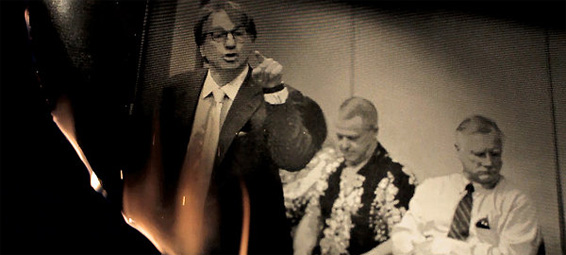In the Reagan Library Republican debate, NBC anchor Brian Williams asked Governor Rick Perry whether in the course of his 234 executions, he ever struggled to sleep at night on the chance that one of the death row inmates might be innocent. The first and entirely bizarre response came from the audience, which erupted in cheers at the mention of executions. Executions, yes! The governor’s response was not as giddy: “No sir I’ve never struggled with that at all.” And then: “In the state of Texas, if you come into our state and you kill one of our children, you kill a police officer, you’re involved in another crime and you kill one of our citizens, you will face the ultimate justice in the state of Texas, and that is you will be executed.”
A number of observers suggested that Williams’s question was a reference to the death of Cameron Todd Willingham, a societal no-count from Corsicana whom Perry executed in 2004 for the death by arson of his three children. Willingham’s fatal ride through the Texas judicial system is the subject of Incendiary: The Willingham Case by Austin filmmakers Steve Mims and Joe Bailey, Jr.
The Willingham story was chronicled in The New Yorker piece “Trial By Fire” by David Grann, published in 2009, and the documentary does little to add to the known facts. Still, film allows for a different kind of storytelling, and it’s powerful. Willingham was convicted of arson based on the flawed, if not frivolous, assessment of old school arson investigators, and we learn that until recently, arson detection was more witchcraft than science. To that end, the clash in the Willingham case put science – and the facts – up against fairy tale forensic techniques, politics, and the nature of the appeals system. It’s a complicated tale, and the documentary organizes the conflict in compelling interviews with all of the key players.
We learn, in perhaps too much detail, the clear scientific evidence that no arson took place in the fires that killed the Willingham children. We listen to David Martin, Willingham’s defense attorney, and perhaps the most riveting character, as he describes his own client with contempt and good riddance. We see the Texas legal system cast in pretty much the worse light possible, as Governor Perry not only denied Willingham a 30-day stay of execution after reviewing a comprehensive report that debunked the arson conviction, but then thwarted the efforts of post-mortem investigation by the Texas Forensic Science Commission by firing three of the scientists on the committee and replacing them with three of “his people.” While it is unclear whether this documentary will be widely released, it will benefit from the light Governor Perry has aimed at himself in his pursuit of the Republican nomination for president, an uncanny bit of cinematic good luck, and perhaps not so lucky for the governor, who has been shrugging off the execution for years.
The film-making in Incendiary is a little unpolished, and some of the interviews go on too long, an easy pitfall for the legal historian. That said, the pacing, with its raw, if occasionally amateur feel, works to the story’s advantage. On the face of it, there was little to admire about Todd Willingham. He beat his wife, couldn’t hold down a job, and was always in some kind of trouble. The life of this forgettable character, from a forgotten Texan town, pitted against his own defense lawyer who had no use for his client, and a politician for whom righteousness is more precious than rights – is a messy story that wouldn’t quite work in perfect stock-like images or Ken Burn’s kind of docu-perfection. Though it is not a uniquely Texan story, the film is flavored well by the thoughtful interviews with the gentle, curious, and bemused Texas scientists and their adversaries who are straight, unquestioning, and never wrong.
Incendiary is not a debate about capital punishment but rather the path that one man took to get there. “Arson is a sneaky crime,” says John Lentini, an arson scientist, in the opening interview of Incendiary, explaining that arson always happens at night; he is not buying for a minute that Willingham would set a fire at 9 a.m. in the morning. What is most intriguing about the Willingham case is how in the light of day, a fire took the lives of three children, and then — for all of the world to see — Texas politics and the legal system took the life of their father. There was nothing sneaky about Willingham’s execution; the question is, was it a crime?





